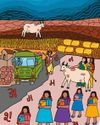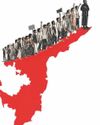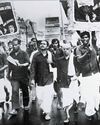Unfair and Outdated
Outlook
|June 01, 2025
The Indus Waters Treaty's blatantly unfair division of water, climate change and upstream actions by China are valid reasons for India to abrogate it or keep it in abeyance

PAKISTAN has written to India seeking reconsideration of its decision to keep the Indus Waters Treaty (IWT) in abeyance. Its letter declares India's action to be “unilateral and illegal”. The tone is not conciliatory, but for the first time, signals willingness to discuss India's concerns. India has declared that it will keep the treaty in abeyance until Pakistan “credibly and irrevocably” abjures support for cross-border terrorism.
Linking talks on the IWT to action on terrorism can be tricky. India has tried in the past to pin Pakistan on its support to terrorism, but each time it wriggled out with insincere promises. The IWT deals with our country's water rights. And our own water needs should have priority over international commitments, especially since there is no accepted international law on river water sharing.
The IWT, signed in 1960, divided the waters of the Indus and its five tributaries, Jhelum, Chenab, Ravi, Beas and Sutlej. India got full rights to the waters of the Ravi, Beas and Sutlej (the 'eastern rivers'), which have an average annual flow of 33 million acre-feet (MAF). Pakistan got near-full rights to the other three rivers—Indus, Jhelum and Chenab—with an average annual flow of 135 MAF. On these rivers, India was allowed very limited consumptive use for agriculture and run-of-river hydel projects. The aggregate storage it could build for all purposes, including flood control, was limited to 3.6 MAF.
Pakistan was given inspection rights to ensure that India adhered to the prescribed storage and consumption limits. The treaty provided for a two-pronged dispute settlement mechanism—a neutral expert for technical questions and a court of arbitration for other issues—enforceable by the World Bank in a time-bound manner. A fund, paid for by both countries, was placed with the World Bank to pay for the expenses.
This story is from the June 01, 2025 edition of Outlook.
Subscribe to Magzter GOLD to access thousands of curated premium stories, and 10,000+ magazines and newspapers.
Already a subscriber? Sign In
MORE STORIES FROM Outlook

Outlook
The Big Blind Spot
Caste boundaries still shape social relations in Tamil Nadu-a state long rooted in self-respect politics
8 mins
December 11, 2025

Outlook
Jat Yamla Pagla Deewana
Dharmendra's tenderness revealed itself without any threats to his masculinity. He adapted himself throughout his 65-year-long career as both a product and creature of the times he lived through
5 mins
December 11, 2025

Outlook
Fairytale of a Fallow Land
Hope Bihar can once again be that impossibly noisy village in Phanishwar Nath Renu's Parti Parikatha-divided, yes, but still capable of insisting that rights are not favours and development is more than a slogan shouted from a stage
14 mins
December 11, 2025

Outlook
The Lesser Daughters of the Goddess
The Dravidian movement waged an ideological war against the devadasi system. As former devadasis lead a new wave of resistance, the practice is quietly sustained by caste, poverty, superstition and inherited ritual
2 mins
December 11, 2025

Outlook
The Meaning of Mariadhai
After a hundred years, what has happened to the idea of self-respect in contemporary Tamil society?
5 mins
December 11, 2025

Outlook
When the State is the Killer
The war on drugs continues to be a war on the poor
5 mins
December 11, 2025

Outlook
We Are Intellectuals
A senior law officer argued in the Supreme Court that \"intellectuals\" could be more dangerous than \"ground-level terrorists\"
5 mins
December 11, 2025

Outlook
An Equal Stage
The Dravidian Movement used novels, plays, films and even politics to spread its ideology
12 mins
December 11, 2025

Outlook
The Dignity in Self-Respect
How Periyar and the Self-Respect Movement took shape in Tamil Nadu and why the state has done better than the rest of the country on many social, civil and public parameters
5 mins
December 11, 2025

Outlook
When Sukumaar Met Elakkiya
Self-respect marriage remains a force of socio-political change even a century later
7 mins
December 11, 2025
Listen
Translate
Change font size

